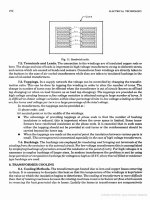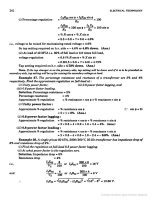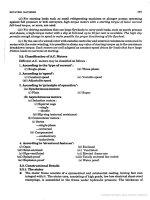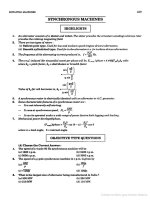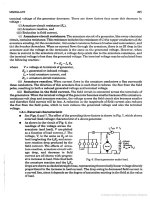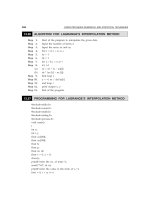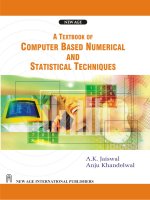A textbook of yoga
Bạn đang xem bản rút gọn của tài liệu. Xem và tải ngay bản đầy đủ của tài liệu tại đây (771.41 KB, 225 trang )
A TEXTBOOK OF YOGA
by
SWAMI KRISHNANANDA
The Divine Life Society
Sivananda Ashram, Rishikesh, India
Website: swami-krishnananda.org
ABOUT THIS EDITION
Though this eBook edition is designed primarily for
digital readers and computers, it works well for print too.
Page size dimensions are 5.5" x 8.5", or half a regular size
sheet, and can be printed for personal, non-commercial use:
two pages to one side of a sheet by adjusting your printer
settings.
2
CONTENTS
About this Edition..........................................................................................2
Chapter 1: The True Nature Of Our Existence.................................5
Chapter 2: The Individual And Creation .........................................19
Chapter 3: The Wholeness Of Creation............................................32
Chapter 4: The Transcendent And The Immanent ....................47
Chapter 5: Understanding Total Involvement .............................59
Chapter 6: The Three Root Desires....................................................74
Chapter 7: The Stability of Body and Mind....................................87
Chapter 8: The Yoga of the Bhagavadgita.................................... 102
Chapter 9: Meditation on the Ishta Devata................................. 117
Chapter 10: Recipes for Meditation Practice............................. 129
Chapter 11: The Rising of the Soul in Total Action................. 142
Chapter 12: The First Stage of Samadhi ....................................... 156
Chapter 13: Standing Inseparable from the Universal ......... 168
Chapter 14: Consciousness Alone Is............................................... 180
Chapter 15: Questions and Answers – Part 1............................ 193
Chapter 16: Questions and Answers – Part 2............................ 208
3
4
Chapter 1
THE TRUE NATURE OF OUR EXISTENCE
Philosophy is supposed to be the investigation into the
causes of phenomena which are around us and in which we
also are involved. We see things happening, events taking
place, but mostly we do not know why they occur at all. We
can observe winds blowing, rain falling, the sun getting hot,
etc. as a routine affair in our daily life, but many of us will not
be able to explain why the winds should blow. Why should it
rain a particular time? Why is the sun hot or cold, as the case
may be? Why are things what they are? Questions of this kind
have often evinced or evoked no proper answer. We find
ourselves many a time helpless in knowing what is
happening at all in this world, and why we are what we are.
The only thing that seems to be impinging upon us and
has a direct effect upon our life is a series of troubles,
responsibilities, difficulties, problems and the like, which we
confront every day. Even if we are daily confronting
problems, responsibilities and troubles, many of us, educated
though we may be, may not know what our problems are.
People many a time complain of difficulties in life. If we ask
them, “Give a list of all your difficulties,” they will not be able
to make a list. There is a chaos even in thinking about one’s
daily confrontations. “What are your problems, sir, about
which you are daily complaining? Tell me all your problems.
How many are they?” It will be very difficult to enumerate
these problems. Even those problems which we are facing
daily with open eyes do not seem to be very clear to our
mind.
Our ancient seers and masters have boiled down all these
problems or confrontations in life to three categories:
troubles that arise from within our own selves, troubles that
arise from people and living beings outside, and troubles that
arise from sources that are usually called celestial in their
5
nature, such as cataclysms, drought, earthquake and
thunderstorms. By ‘celestial’ we do not actually mean coming
from the gods in heaven, but from that which is above the
earth, above our normal ken of operations.
If you would not mind me using one or two Sanskrit
words, I may tell you how these ancient masters have
designated these problems. Troubles that arise from within
our own selves are called adhyatma. Here atma means one’s
own self, whatever be the concept of our self. The so-called
‘me’ is called atma. We have problems arising from our own
self. We have a headache, stomach trouble, indigestion,
fatigue, fever; we have mental disturbance, are worried, have
emotional tension and sleeplessness. All these may be
considered as problems arising from one’s own self. They are
called adhyatmika problems, or psychophysical problems.
Adhyatmika may be translated as psychophysical – arising
from the mind and body.
There is another major problem involved in our personal
life – the death of this body, which we may not categorise
with these well-known problems. This body has to be cast off
one day. That is the greatest problem, we may say, among all
others considered in total. The worst problem is the event of
impending death in this world, which is unavoidable. Good
man or bad man, high or low, rich or poor – everybody has to
go. As the poet tells us, sceptre and crown shall tumble down;
king and beggar will be razed to the ground. We will not
know the difference between this and that when death takes
place. And it can take place any day. This also is a very
serious matter before us.
We have other problems, such as problems from people.
We say, “Oh, what is this world! See how people are
behaving!” There is political tension, social tension,
communal tension, animosity, hatred, quarrelling, war. These
troubles that arise from outside are called adhibhautika –
socio-physical, we may say. The first one was
psychophysical; this is socio-physical. Here the word
6
‘physical’ may include political, communal, and so on. And
the third variety of trouble is what I mentioned earlier. We
do not know when it will rain; and when it rains, it may come
with an unexpected force. Or rain may not come. We
complain of drought, famine, and so on. Everything in the
world – all events in the world – have been classified into this
threefold enumeration of human confrontation.
In this predicament of our having to face a threefold
responsibility, what are we going to do? If we just casually
look at this situation with our mental eye, we will find that
we will not be able to take even one step forward. There is
nothing that we can do. “I feel totally helpless in this matter,”
is what we may feel. But, we also have something in us which
tells us oftentimes that things are not as bad as they appear.
If everything is utterly meaningless, chaotic and helpless, we
will not be able to lift a finger and will not have any impulse
to do anything in this world. If everything is a chaos, what
can we do?
Together with this particular level of our psyche which
tells us that things are almost beyond our control, there is
another element in us – a part of our psyche itself, we may
say – which tells us there is always a hope for the future.
Among many other types of hope that we entertain in this
world, one of the most intriguing hopes is that we are not
going to die tomorrow, though there is no saying as to why
we feel like that. Who told us that tomorrow is not the last
day? But, let anybody say anything, “I know very well it
cannot be tomorrow.” Who is telling us that it cannot be
tomorrow? This is the higher aspect of our personality,
which lifts us above the involved consciousness – the mind
that is involved in phenomena, to which I made a reference
briefly. We have, as they say, a lower nature and also a higher
nature. The lower nature makes us feel that we are puppets
among people. “What can I do in this vast sea of humanity? I
am one among many; I can do nothing. Problems are
manifold, and I am single.” This is the lower nature speaking.
7
The frailty of the physical body, the ignorance of the mind,
and the finitude of individuality itself in the midst of a large
society of people – this consciousness of ours is actually our
lower nature saying that we are just small units in this world
of humanity, of nature as a whole.
Do we not we feel very helpless and little before this vast
astronomical universe? Look at the sun and the moon and
the stars; look at this vast sky. No one knows where it ends,
where it begins. Modern science and physics sometimes tell
us that the stars are receding and the universe is expanding,
and they rush into outer space with speed incalculable, and
with distance between them which is measured in what are
called light years. The speed of light is 186,000 miles per
second, and the distance light travels with this speed for one
year is a light year. And millions of light years – enough to
make us feel giddy even by thinking about this – such is the
distance, they say, that obtains among the stars which seem
to be studded in the sky like diamonds before our naked eye.
What are we before these things? We are very small
creatures crawling on the surface of the Earth, and the Earth
is considered to be a very tiny dot in the galaxy – even among
the planets in the solar system. Everywhere we seem to be
cornered from all sides, and we seem to be nothing before
the might of the astronomical universe and the sea of
humanity around us. Is this our fate, finally? Sometimes we
feel that it is. Nothing can be done before this mighty
universe. It is beyond us; all things are above us and beyond
us. Uncontrollable is this whole situation, astronomical as
well as social.
But there is, as I mentioned, a higher nature in us which
tells us that we can conquer nature. We want to probe into
the mystery of existence; we want to control mankind; we
would even like to become the emperor of the whole earth, if
we can. Practically, it seems not to be a possibility. But there
is a feeling inside that it can happen. “I can rule this whole
world, under given conditions. I can control the phenomena
8
of nature by certain operations, by investigations, by
experiments and observations. I can overcome the world,
control it, master it, use it and harness it.” Such desires are
also in our mind. So we seem to be double personalities –
sinking, as it were, on one side, and raising ourselves to
incredible heights on the other side. We are small and big at
the same time. We are finite; we are also infinite.
This is an introductory presentation of the circumstances
of life in which you seem to be involved. All this has to be
probed into very, very thoroughly. The structure of these
situations, as well as their causes, must be studied. This
investigative process, this in-depth analysis of human
situation, is called philosophical study. Philosophy does not
mean any particular doctrine or school of thought, as you
may imagine or might have been told. Philosophy is not a
school of thought of a particular historical occasion or time. It
is the attempt of the mind to probe into the causes of events
in the world, circumstances of every kind. This is the attitude
of philosophy.
The ancient masters have taken time to go deep into this
circumstance of life and took the initial step with what one
can consider as the immediate fact of life. You have heard
that there is a thing called yoga. Yoga actually means union
with the fact of life. Without going into technological jargon,
briefly and simply we may define yoga as union with the fact
of life. Now, what that fact of life is, it is up to you to find out.
Or we may say, union with Reality in every degree of its
manifestation is yoga. You have to be in union with every fact
of life and every degree of Reality, if possible at all times, at
every time. This is the purpose of yoga.
Let us take into consideration the immediate fact of life,
which seems to be before us as an indubitable presentation
about which you have no doubt at all. I am taking you to a
peculiar mental operation where you have to concentrate
your mind carefully. When you say “a fact of life” or “a reality
of life”, which meaning is etymologically, grammatically,
9
clear before you, what do you actually mean? A thing about
which you have no doubt at all may be regarded as a fact. If
something is dubious and uncertain, that cannot be
categorised as a fact – because it may not be a fact, inasmuch
as you have a doubt about it. Is there anything at all in this
world about which you have no doubt? People say this world
exists; some people say this world does not exist as it
appears before our eyes. People say that things are very bad;
some people say, no, they appear to be bad but there is
something else behind it. All kinds of things are told
historically, economically, geographically, geologically,
astronomically, whatever it is. As science advances, the
previous discoveries are cast out as not facts. Centuries of
scientific advancement are before us, and we will find that
even great scientists such as Newton are considered as not
having touched the vitality of life.
Every day we discard the previous discoveries we
considered as facts, and add another fact. A fact that can be
cast away as not a fact cannot be regarded as fact at all. A
transitory fact is no fact. It must be permanent. It should
always be there, and we can never raise a question about it.
Only then can it be considered as a fact. Such a fact – what is
it? The entire world, which is moving in the process of
evolution, casting away earlier shapes of its circumstance for
the sake of a newer one, cannot itself be considered as a fact
– because it moves. Anything that is in transition cannot be
regarded as an ultimate fact. So is human history, which is a
river moving forward, as it were. History moves onward and
forward with all its ups and downs and vicissitudes. These
are all enigmas before you. But there is something about
which you seem to be very clear, and you do not have any
doubt: Do you exist, or have you any doubt about your
existence also? Let the world be there, let the world not be
there; let people be there or not. Do you exist? Yes.
There are some people who call themselves sceptics;
they doubt everything. A question was raised in
10
philosophical circles: Can the doubter doubt that he exists? I
met a Buddhist theologian who said, “Yes, I even doubt that I
exist. I am not even sure that I exist.” He carried his
scepticism to the breaking point. Then a question again
arises: Do you doubt that you have a doubt about your
existence? There the questioner has to close his mouth. You
cannot doubt that you are doubting your existence – then the
doubt gets cancelled, and the sceptic cuts the ground from
under his own feet. So, there is something about which you
are not in doubt. The point is that you certainly exist and, as I
mentioned, you cannot doubt that fact because if you doubt
it, you are doubting the very fact of doubt itself. Hence,
accept that you exist.
In this matter, there is no doubt: I do exist. Now, what
kind of ‘I’ is it that exists? When you say, “I exist,” what kind
of ‘I’ is this? Mr. So-and-so, Mrs. So-and-so, this brother, this
sister, this boss, this subordinate, this rich, this poor – is this
the ‘I’ to which you are making reference when you say “I do
exist”? When a merchant says “I exist”, he does not mean that
his richness exists, because richness may not exist always.
And also are other associations with oneself. You cannot
define yourself in terms of associations and qualifications,
because they may be there or may not be there. Minus all
associations and relations, you can be. If everything goes –
lock, stock and barrel, nothing exists – you will be there.
What kind of ‘you’ is this? The immediate prosaic answer
would be: “This me, this ‘I’ that seems to be there
undoubtedly, is this five or six-foot-tall, two-foot-wide
physical personality. This is what I can consider as me, for all
practical purposes: this ‘me’ which I can see with my own
eyes, which you can also see with your eyes. This physical
body of mine which has dimension and weight, this material
substance which I can touch and sense, is what I can call
myself. What else can I say about myself?”
Go a little deep into this matter. Is it true that you are this
physical body? Because there is nothing else in you except
11
this body that you can visualise, you say, “Yes, there cannot
be anything else to me.” Do you mean to say that this ‘me’,
this ‘I’, is this total aggregate of the limbs of this physical
body? “Yes,” will be the answer, “These hands and feet, this
nose, these eyes, these lungs, this heart, this flesh, bone,
marrow, and so on – all this put together in a proportion is
me. I am all these things assembled in a particular way.” Are
you sure that this is the answer to your question? The first
answer is, “Yes, what else? I am this conglomeration of the
physical elements.”
If some limbs are not there, some part of ‘me’ will not be
there. Is it true? There are people without legs. Are they a
little less in their ‘me’ or ‘I’, in comparison with those who
have two legs? Suppose there is a person who has no legs
and no hands; a large percentage of ‘me’ has gone away. Ask
him, “Are you wholly existing, or only partially?” He will say,
“I am whole.” He will not say, “I am a half man.” The limbless
person is not a half person; he is a whole person. How is it
possible? If all the limbs are necessary to make you feel
whole, how can limbless people feel that they are whole?
Legless and handless, fifty percent has gone; he should feel
that he is only fifty percent, and not a whole person. But that
is not so. If fifty percent of the body is not there, due to
amputation or to some accident, the person is still whole.
What do you mean by this feeling of wholeness? “I am full,
sir.” He is as great a person as any who has all his limbs
intact.
Do you agree that there is a defect in your definition of
the personality as just this body with all the limbs? You have
to think thrice before saying anything further. “So, ‘I’, this
‘me’, does not seem to be merely the conglomeration of these
limbs of the body, because without them also I seem to be
there. I am existing there. But what is this ‘I’? The personality
itself is in doubt. In the beginning, I thought everything was
clear to me. Now I am feeling that there is some mistake
because I have analysed the situation a little further and feel
12
that even if fifty percent of the physical body has gone, I will
be still whole.” How is this possible? How could you be
whole, when half of you has gone? Is it not a contradiction?
“Maybe, but still I am whole.”
Ancient thinkers, philosophers, masters and sages have
analysed this situation further. You cannot easily answer this
question as to why you feel whole, in spite of the body having
gone in some percentage. The analysis conducted is in terms
of certain experiences through which you are passing. What
are the experiences through which you are passing? In
waking life, you have an externality consciousness. But you
are not always in the waking condition. You also go to sleep
and dream. When you dream, you have a consciousness in
the same way as you have a consciousness in waking. But
there is a difference. The sense organs – eyes, ears, etc. – are
active in waking life; they are not active in dream. The
physical body is not an object of your consciousness in
dream. You are not aware that you have a body, yet you are
aware of something.
Now, think of this situation. Are you existing in the state
of dream? Certainly. Are you existing with bodyconsciousness, or minus it? You are totally bereft of bodyconsciousness. In the beginning, you thought that this body is
‘you’ because there was nothing else that you can say about
your body. Then it became a matter of doubt because you felt
that the body does not seem to be the entire ‘me’, because
even if you are bereft of certain limbs, you seem to be whole.
And now you are in a third predicament – that you seem to
be capable of existing even without being conscious of the
body. Why? Because in dream, which is also a state of
existence, which is a state of consciousness, you are totally
free from association with the physical body.
The third analysis or conclusion is: You can exist minus
consciousness of the body and minus consciousness of your
wealth, property, relations, family, circumstances, and so on.
In ordinary life you identify yourself with family, political
13
conditions, etc., and you get mixed up with them to such an
extent that you are always thinking of yourself as a father,
mother, husband, wife, etc. You have no other definition. But
in the dream state, these associations are severed; you can
exist independently, minus these associations – minus even
the body. In the state of dream, you are existing even without
the body. What is it that is existing in dream? It is a mental
operation. You are existing as a ‘psyche’, rather than as a
body. All right, let us take for granted that you are the
‘psyche’ – that you are more a mind than a body. Let us come
to this conclusion. Are you sure? It is clear that you can exist
only as a mind, minus the body, because it is seen in dream.
Now go deeper.
When you are fast asleep, what happens to the mind? It
does not think. It sees nothing. There is no consciousness
whatsoever of anything at all when you are fast asleep – no
body, no social relations, no mind either. Now, think of this
situation again: In the state of deep sleep, you exist, isn’t it?
Certainly, you do exist in sleep, minus associations of every
kind. You are not a president, a minister, a rich man, a boss, a
husband, or a wife. You are not anything – not even the body,
not even the mind. Did you exist in deep sleep? How do you
know that you existed in deep sleep? Who told you? Are you
verifying this by comparing your experience with somebody
else’s? Did you wake up in the morning and ask somebody:
“Did I really exist yesterday?” No, you do not put questions
like that. You do not have to verify by any kind of experiment
whether you really existed in sleep. But without any kind of
verifiable medium, how did you come to know that you did
exist in sleep while you had no consciousness? Minus
consciousness, there is no experience. You had totally no
experience in the state of sleep – no consciousness. What
makes you feel that you existed there? Who told you?
Now here is a further analytical process, which is
psychological and philosophical. You may say, “I know that I
did exist in the state of sleep by the memory that I have. I
14
was, yesterday, and I had a very good sleep.” People say, “Oh,
I had a very good sleep.” Who makes this statement? Mr. Soand-so? That Mr. So-and-so was not there; he was totally
dissociated from what existed in the state of deep sleep. Who
is saying that they had a memory of sleep? Tell me, what do
you mean by memory? You use the word ‘memory’ – a
recollection. What does it mean?
Memory is a consequence that follows as an aftermath of
a conscious experience. If you have no experience, there will
be no memory afterwards. That means to say, in order to
have a memory of having slept and having existed in the state
of deep sleep, you must have had some experience in that
state. Minus experience, how could you have memory? You
would be like a brick. A brick does not remember anything.
But you are not like a brick in the state of deep sleep. Though
you look like a brick for all practical purposes, it does not
seem to be that way because if that had been the case, there
would be no memory. Were you having an experience in the
state of sleep? At that time, you cannot say that you had any
experience, because experience minus consciousness is
unthinkable, and there was no consciousness. Therefore, you
can say, “I had no experience.” But if that is the case, there is
no memory. So, you face a contradiction here again.
Somehow or other, there seems to have been some sort of an
experience even in the state of that total unconsciousness
which is sleep – without which, there would have been no
memory afterwards. What experience were you having in the
state of deep sleep? It was not an experience of body, not of
mind, not of any kind of external social relation; it was just
existence. What kind of existence? The existence in the state
of deep sleep was free from associations of every kind. See
how some great truth comes out from this little analysis.
Were you very happy in sleep, or very unhappy? Even an
unhappy person wakes up with happiness after sleeping.
Even if there is a wound which is giving agonising pain, you
feel a little refreshed after a good sleep. The joy of sleep is
15
incomparable, as everyone knows. The restfulness, the
blissfulness and the composure that you feel in the state of
deep sleep is incomparable. It cannot be compared with any
kind of happiness that you can think of in this world – which
means to say, you can be happy without any relation with
anything, if the time for it comes. Not only can you be happy
without any relation with things, it is the greatest happiness.
Other types of happiness are elusive; they can run away from
you any day. There can be bereavement of causes that appear
to be giving you satisfaction in life. But here is something
which will not leave you.
This is an incidental, secondary matter; we shall not
touch upon it just now. The point is that you had a kind of
peculiar existence-consciousness, we may say, though you
cannot verify it by any method of observation. By inference
of the circumstance of deep sleep, you can come to the
conclusion because of the memory following it that there
must have been a state of consciousness; otherwise, memory
cannot be explained. You existed, pure and simple, a bare fact
of being, unrelated to circumstances outside – not even
related to space and time, let alone other things.
Again listen to me carefully. You had a consciousness in
the state of deep sleep; you cannot say that there was
anything else. “I have a consciousness that I slept.” At that
time, did you have other consciousness of anything else other
than the fact of having slept? No, there was no consciousness
of anything else. There was no consciousness of the world of
space and time and objects. “It was only a consciousness of
my having been there. There was no other consciousness.”
Your consciousness of having been there means
consciousness of your existence. What was it that was there
in the state of deep sleep? Consciousness of existence –
existence which was conscious of itself. Do not allow the
mind to slip away from this fact that you existed as existence
which was conscious of itself, that only consciousness was
existing.
16
Now, I will use two other Sanskrit words. In Sanskrit,
Existence is called sat. Pure Being is called sat; and
Consciousness is called chit. In Sanskrit philosophical
terminology it is said that we were in the state of deep sleep
as sat-chit, Existence-Consciousness. Inasmuch as we were
also happy, we were also associated with ananda. So what
was our state? Sat-chit-ananda is the Sanskrit definition of
Existence-Consciousness-Bliss. We were existing as
Existence-Consciousness-Bliss. Not existence of something –
it is pure, unadulterated, featureless, transparent Existence.
It is not consciousness of something, but Consciousness of
Existence only, so it is not an objective consciousness. It is
Consciousness, pure and simple, unrelated. Unrelated
consciousness is something worth considering.
What is the meaning of unrelated consciousness? “I have
never heard of such a thing, because all consciousness is
related to something – related to the world outside, people
outside, this body, this mind.” We have abrogated all these
associations; now we have come to the conclusion that we
seem to be something fantastic – not as we thought ourselves
to be. “I never knew that I am like this! I am not a bundle of
social relations – not even this body and mind. I seem to be
something which I never thought myself to be – a great
discovery of myself.” It is featured featureless, unrelated
existence which is conscious of itself, conscious of itself only
– not conscious of something else. It is Pure ExistenceConsciousness, Pure Bliss unrelated to anything else. “Oh
wonderful! This is me!”
‘Unrelated’ means not having anything external to it.
Anything that has no externality also has no relativity.
Therefore, we call it Absolute. It is Absolute ExistenceConsciousness-Bliss – not related consciousness, related
bliss, etc. Incidentally, anything that is absolute, which is not
relative, is also timeless. Actually, eternity was scintillating in
you when you were in deep sleep, of which you are not
17
aware. This fact has to be investigated further, deeper. Let us
see how we can do it.
18
Chapter 2
THE INDIVIDUAL AND CREATION
It was concluded that the essence, the true being or the
reality of an individual is something quite different than
what it appears on the surface to the perception of the naked
eye. We do not seem to be what we appear to be. All our
perceptions in the world seem to be misguided, far removed
from the facts that govern life as such. We landed on the
conclusion that we can exist independent of every kind of
relation, which we actually do when we are in the state of
deep sleep.
We are under the impression that relations are
important; and life is nothing but a bundle of relationships.
Whenever we define ourselves or describe conditions in life,
we express ourselves in terms of relations. In terms of
relations, connections, associations, we understand life. Life
has no meaning if it is not related to something that appears
to be externally dovetailed to it.
Now what we, by analysis, understand is, this is not the
case. We have an independence of our own – a personality
that can stand on its own legs. It is not always essential for a
person to be hanging on somebody else for his ultimate
survival, though it looks as if we cannot exist without
depending on external factors. It was also noted that this
dual aspect of our personality is due to our involvement in
phenomenal relations on the one hand and, on the other
hand, our being totally free from every kind of relation.
We have, as they say philosophically, an empirical side
and also a transcendental side. Empirically we are bound to
the body, to human relations and to natural circumstances;
transcendentally we are absolutely free. This transcendent
freedom that is at the root of our being is the hope of our life.
Our aspirations, rocketing up to the skies, can be explained
only in terms of the transcendent reality that we really seem
19
to be. Otherwise, our long-stretched aspirations have no
meaning. They cannot even be conceived.
The desire to live as long as possible, even hundreds of
years if it is practicable, can only be explained if we are free
from time. A person bound to time cannot aspire for a
timeless longevity or a durationless existence. Because of the
involvement in the time process, we seem to be decaying and
heading towards death. But because there is something in us
which is not so involved in time, we hope for a better future,
though we do not know where that future is and what kind of
future it is.
There is both an infinity of longing and an endless,
durationless desire working together at the same time,
telling us that we are not bleating sheep but powerful lions
with immense strength. But the mind is a trickster, about
which we shall study a little later in our course of
discussions. All this put together leads us to the conclusion
that we are essentially independent existence, free from
empirical relations. This was noticed in the state of deep
sleep, and we did exist there in a more pleasant way than in
any other empirical condition of waking life.
Again, please remember all the processes we discussed
earlier. These things that we are discussing are not just
information that is poured on your head, but something
which will benefit you in your practical existence in this
world – which will mould you and make you something
superb and novel. If you could exist merely as a kind of
consciousness, which was the case in sleep, this has to be
deeply pondered over. What could have been the nature of
that consciousness? What is meant by ‘consciousness’?
Psychologically speaking, consciousness can be defined
as a subjectivity that is aware of something. The pure
subjectivity in us which is experienced by us in the state of
deep sleep is aware of something. We are aware of
something now in the waking state, but this awareness in the
waking condition is not of our subjectivity. We think very
20
little of our own personality in our day-to-day existence; we
think mostly of things outside. Just imagine what you are
thinking in your mind from morning to evening. Do you go on
thinking of yourself? You think only that which is not you –
things outside. But in the state of deep sleep, the reverse
process takes place. All that importance that you attach to
the outside world is severed from your experience, and you
are what you are; you stand by yourself. In ordinary waking
life, you are involved in things which are not you, but in the
state of deep sleep, you are only in you.
Would it be good to be in you, or would it be good to be
not in you? This is a great question. Would you like to always
be other than what you are, or would you like to be what you
are? Certainly, you would not like to lose yourself in
contemplating that which you are not; and a loss of yourself
is implied in all contemplations on that which you are not.
The more you think of objects outside, the more you have
lost yourself. Therefore, misery rains upon you. The more
you think of things outside – persons, the world, etc., and
involvements of every kind – the more is the loss of your
personality, the larger is the world for you, and the smaller
are you at that time. Unless you are very small, the world
does not look big. Your smallness is disproportionately
related to the bigness of the universe. The more astounding
and inscrutable is this universe before you, striking marvel in
your mind, the more finite you are at that time. Is this the
case?
It has been noticed that a thoroughgoing analysis of the
nature of the consciousness in our deep sleep will give an
answer to this question. Are we puppet-like in this world?
The most difficult thing in the world is to understand one’s
own self. Great seers have proclaimed: “Know thyself and be
free!” You will be wondering, “How can I can be free by
knowing myself?” Most people think that they know
themselves very well. Don’t you know who you are? “Yes,
very well.” We have a passport description of our
21
personality. Now, “How can I consider myself as free? The
passport itself is a bondage, so what do you mean by gaining
freedom by knowing one’s own self?” Here is a metaphysical
quandary before us. An ordinary, untutored mind cannot
understand it.
You will find that this is difficult to understand, and may
ask: “What are you telling us? Can I be free by being myself?”
This is because a little shadow of your original wrong notion
of yourself still persists. You seem to be carrying your finite
psychophysical definition of yourself even to the description
of the state of deep sleep when you feel doubtful about what
this freedom of “I am just what I am” could be. However
much you may go deep into this matter philosophically, you
will find that a psychological difficulty persists. The
persistence of this difficulty is due to the mind interpreting
transcendental matters – the mind that is involved in space,
time and relations.
You have to listen to me carefully here again. The mind
that is involved in space, time and relations is trying to
understand that which is not involved in that way. So in the
early stages, it looks like a difficulty and a contradiction. The
involvement of the mind in external relations is so profound
that you seem to be incapable of thinking in any other
manner at all. Even if you agree for the time being that your
essential nature is Pure Existence-Consciousness, when you
start thinking of it, you wrongly locate it somewhere.
Do you not feel that this Existence-Consciousness is in
you? But this is a wrong definition of yourself. In the state of
deep sleep, you are not inside yourself; you are just what you
are. So, do not say your consciousness is inside you. There is
no insideness there; it is just what you are. Difficult it is to
conceive this! The existence that you are, unrelated being
that you are, Pure Consciousness that you are in the state of
deep sleep is not something inside you, as if you are outside
it. So do not make the mistake of juxtaposing a wrongly
22
related psychophysical individuality with that which you
really are.
The whole point is, we cannot get out of this clutch of
psychophysical involvement, however much we may try. And
where doubt persists, a kind of fear also persists
simultaneously. Whenever there is doubt, there is also fear:
“Where am I heading?” Here, a very subtle investigative
approach is called for. Yoga philosophy and psychology tells
us that an impure mind cannot study this subject. A mind full
of desires, with suppressed emotions, torn feelings, nonaligned internality – persons with such a mind are not in a
position to understand this subtlety.
In the Yoga System, it is mentioned again and again that
the mind has to be purified before it embarks upon
investigations of this kind, because you are trying to rise
above yourself, together with an attempt to rise above the
world. This attempt will not end in success if you are already
involved in the world and very much fond of yourself as a
body and personality, and loves and hates tear you day in
and day out.
Every yoga student is, to some extent at least, a sincere,
honest, purified mind, with no muddle in his conscience. You
should have no conscience pricking you. You should be very
clear that your search is honest, it is one hundred percent
sincere, and you are not just making a joke with it. If this
sincerity is at the back of your pursuit, you shall certainly be
able to achieve your purpose.
This consciousness which is existence, which is what you
are basically, is not somewhere. This also is an important
thing to remember. Where is this consciousness that you are?
Is it lying on the bed when you are sleeping? Is the
consciousness just as wide as the cot on which you are
sleeping? The mind may say, “Yes, it is so,” but it is not so.
The consciousness is not sleeping; the sleeper is somebody
else.
23
You cannot locate consciousness in space and time,
because consciousness is that which is conscious of space
and time. Therefore, it cannot be involved in space and time.
Space and time are objects of consciousness. How do you
know that there is space, time or objects? The knower cannot
be involved in that which is known. If the knower is involved
in the known, there cannot be knowledge of the known.
So, we have drawn another conclusion: This
consciousness that we are is not involved in space, not
involved in time, and not involved in any kind of physical or
external relation, merely because of the fact that if such
involvement had taken place, the consciousness of there
being such things would not be there. If consciousness was
not involved in space, it would be spaceless. If it was
spaceless, it would be dimensionless. If it was dimensionless,
it would not have a location. For the purpose of our
understanding at present, it would be everywhere. That
which is not located in space is spaceless, dimensionless; we
may say it is infinitude. Are we all-pervading in our basic
essence? Is this not an astounding, wonder-strucking,
unbelievable conclusion? “I was thinking that I am only a
little person somewhere, living in a little flat, in a little room.
Am I something more than this?” This is a great solace here.
This message of yoga, this message of Vedanta, this message
of the ancient masters is a solace when we appear to be
sinking in this world of problems galore.
If this is the case, then our entire attitude to life changes.
How would we live in this world of persons and things if this
is our real nature? The conclusion that follows from this
analysis will be clear to each one of you: You will not be a
person afterwards; you may perhaps be called a superperson. Persons who have transcended the consciousness of
personality and are able to live a super-personal existence,
being sure of it being there, are called super-human beings –
super-men, super-persons, super-individuals.
24
To think this, to be brooding over this, to be conscious
only of this, would be the greatest spiritual meditation that
you can think of. No meditation is greater than this. What is it
that you are thinking? The mind will shudder with a fear of
its being lost in this vast ocean of a discovery that it cannot
contain within itself. It is like an ocean entering a little pot;
the pot will not be there anymore. Infinity seems to have
entered this finitude of human individuality. This vast world
of perception is a universal object, as it were, presented to
this Universal Consciousness.
The seer of this world is not a person. We have already
come to the conclusion that you as a seer of this world are in
your own root. This universal comprehensiveness looks like
a little individuality because this essential universality of
consciousness has been locked up within the little prison
house of this body conditioned by the sense organs, and the
whole sea of consciousness is peeping through these
apertures of the sense organs and seeing itself in the world of
objects – as it happens in dream, for instance. The big things
that you see in the dream world – space, time, mountains,
rivers, sun, moon, stars, and everything seen in dream – are
presented outside. They are as much external as is the world
in waking life. But what is this mountain in dream made of?
Is it a physical substance? Can you touch it? You can hit your
head against a wall even in dream. You can feel hunger and
thirst. What are these substances in dream made of?
You may say this world is made of physical substance,
hard material. What is the material out of which the dream
object is made? It is made of mind-stuff – psychic essence. If
the mind is not to be identified with matter, then the world of
dream also cannot be considered as a material perception. It
is psyche perceiving psyche by externalising itself in a mode
of alienation of its own psychic individuality. This is what we
call dream.
We are told that in this waking world also, a similar
cosmic operation has taken place. As an individual psyche
25

